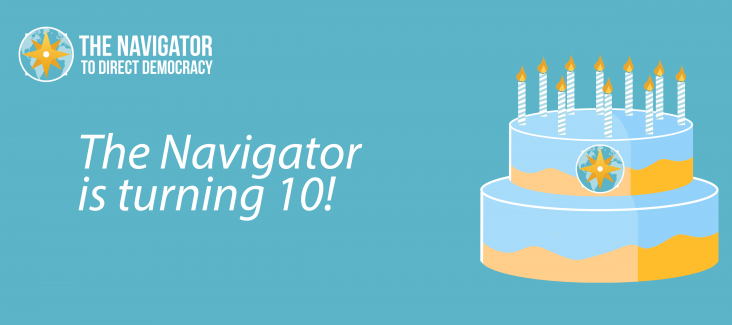On 1 November 2010, Dr Klaus Hofmann uploaded the first “legal design”, a schematic analysis of the legal framework defining a specific direct democracy instrument in a given country, onto the Direct Democracy website. It was the beginning of quest to map all existing direct democracy instruments in the world on all levels: national, regional and local.
--------------------
The simple idea behind the Navigator database: to provide a tool for citizens and experts alike, providing basic knowledge on the rules of direct democracy instruments worldwide. Everyone can use the database to look up what possibilities exist in her or his country and get all the necessarry information. Of course the data the Navigator provides also constitutes a great starting point for research and comparision. The Navigator database is updated regulary and offers additional tools to make comparison and visualisation easier.
---------------------
The Navigator had been called into life by the Initiative and Referendum Institute Europe (IRI Europe), which had worked on developing a general typology of direct democracy instruments and now wanted to set out to chart the existence and use of these tools around the world. Originally, the Navigator was a crowd-sourced platform where people could enter in the information on the existing laws in their country themselves, but soon the need for a more permanent, academic approach became clear. This is where Dr Hofmann came in.
“Back then we started from the very basics,” he explains, “I started by researching the constitutions of ever nation state in the world and analyzing which provisions and framework it provided for direct democracy. I was researching all of these countries I had never visited or given much thought to, like for example the Pacific island states. So, to put myself in the mood when I started to research a new country, I listened to the national anthem first.”
Soon, Dr Hofmann could move on from analysing constitutions to mapping all existing laws related to direct democracy on the national level. From there, he worked his way down to the regional and local levels.
Today, the Navigator is hosted by the Research Center of Citizen Participation/Institute for Democracy And Participation Research of the University of Wuppertal in cooperation with Democracy International and the IRI Europe and supported by swissinfo. Dr Hofmann, now presides over most complete database on direct democracy legislation in the world. It is continuously updated, which is a full-time job on its own. “But the next phase is to really put this data to work. I would like to see the Navigator evolve into a basis for direct democracy research projects,” he says.
A first step in this direction was made in 2018, with the Political Culture and Active Citizenship Symposium at the Bergische Universität Wuppertal. The question on the agenda was, why similar direct democratic instruments are used so differently in different countries. Dr Hofmann invited scholars from seven countries to explain what the obstacles and incentives are for citizens to participate in policymaking in their countries. A new research project and conference on the role of direct democracy in mitigating conflicts is already in the works and a part-time researcher joined the team to help prepare the project.
Researching direct democracy tools and practice so comprehensively for over a decade, Dr Klaus Hofmann is perhaps the best-placed person in the world to answer the question “What is the state of direct democracy today?”
“Well, what I can tell you for sure is that only one nation-state introduced direct democracy legislation, that is Taiwan, and two states have effectively abolished it: the Netherlands and Austria,” he explains, “In fact, this last one was just last week when the Austrian Constitutional Court declared that holding binding citizen-initiated referenda on the local level in the state of Vorarlberg is in conflict with the federal constitution.”
He expects this negative trend to continue in the future as well: “Unfortunately, it seems that there is a worldwide tendency to reduce direct democracy. This is a very worrying development. Of course there are also countries moving to introduce direct democracy,” he counters, “In Ukraine, it was an election promise by President Zelensky and also Armenia is looking to introduce new legislation. But both countries are also currently experiencing conflict and the question is of course in how far can citizens’ democratic rights be guaranteed under these circumstances.”
Are there any specific votes that stuck out to him in the past ten years? “The obligatory referenda on constitutional changes in Ireland of the past couple of years are really nice examples to me, because they are a marker exactly of how the political culture in a country can change over time,” he says of a series of votes to remove the provisions banning same-sex marriage, divorce, abortion and blasphemy from the Irish constitution. “There are of course also examples of referenda where I don’t necessarily agree with the outcome, but that is politics – some decisions I like and others not. In fact, that is exactly the point of direct democracy. The important thing is that the people decide themselves.”

